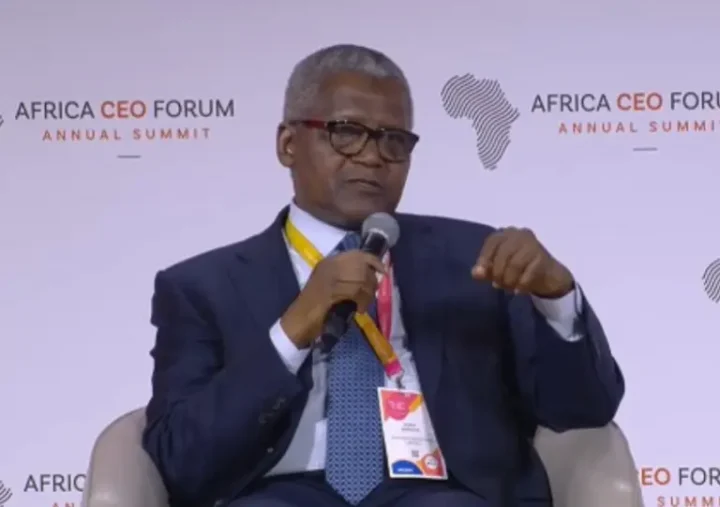Aliko Dangote, the prominent Nigerian industrialist and founder of the Dangote Group, has raised an alarm regarding the blending and distribution of substandard fuel by a new depot in Nigeria. Dangote voiced concerns over the quality of fuel being circulated in parts of the country, emphasizing that such practices could have detrimental effects on vehicles, machinery, and the environment.
Concerns Over Substandard Fuel
According to Dangote, the fuel being blended by the depot falls below acceptable quality standards and does not meet the regulatory requirements set by the Department of Petroleum Resources (DPR). The warning comes as Nigerians already contend with the challenges of fluctuating fuel prices and inconsistent supply. Dangote’s remarks highlight the potential risks posed by substandard fuel, which can damage engines, increase maintenance costs, and reduce fuel efficiency.

Dangote’s warning comes amid efforts by stakeholders in the Nigerian oil and gas sector to address the challenges associated with fuel quality and distribution. Industry leaders have long emphasized the need for stringent regulatory oversight to prevent the distribution of low-quality fuel, which can create a multitude of economic and environmental issues.
Economic Impact of Substandard Fuel
The blending and distribution of substandard fuel pose significant risks to Nigeria’s economy, particularly as the country relies heavily on petrol for transportation and industrial activities. Poor-quality fuel can lead to increased maintenance costs for vehicles, machinery, and equipment across sectors, potentially impacting productivity. Motorists, businesses, and transport companies are directly affected when their vehicles and equipment experience frequent breakdowns due to low-quality fuel.
Furthermore, substandard fuel can exacerbate issues in the transportation and logistics sectors, which are critical to the Nigerian economy. Transport companies, already grappling with the challenges of high fuel costs and road infrastructure, may see operating costs rise further due to increased vehicle repair and maintenance needs. For consumers, this can translate to higher transportation fares and a ripple effect on the cost of goods and services across the economy.
### Health and Environmental Hazards
Beyond the economic implications, Dangote’s warning sheds light on the potential health and environmental hazards associated with substandard fuel. Poor-quality fuel is often associated with higher emissions of harmful pollutants, such as sulfur compounds and particulate matter, which can degrade air quality and contribute to respiratory issues among the population. In densely populated cities like Lagos, increased air pollution could pose significant health risks for residents, particularly those with pre-existing respiratory conditions.
The environmental impact of substandard fuel is also substantial. Low-grade fuel can lead to higher carbon emissions, which contribute to climate change. Additionally, its combustion releases toxins that contaminate the air, soil, and water. These pollutants can have long-term effects on biodiversity and the natural environment, complicating Nigeria’s ongoing efforts to address environmental challenges.
### Regulatory Oversight and Quality Control
In response to concerns like these, Nigeria’s regulatory agencies, such as the DPR and the Nigerian National Petroleum Corporation (NNPC), play a critical role in ensuring fuel quality and preventing substandard products from entering the market. Dangote’s remarks underscore the importance of enforcing strict compliance with quality standards and holding depots accountable for blending practices that compromise fuel integrity.
The call for stronger oversight echoes previous appeals from stakeholders in the oil and gas industry for enhanced regulation and monitoring. Experts argue that by intensifying quality control measures and conducting regular inspections of blending depots, regulators can mitigate the risk of substandard fuel reaching consumers.
### Call to Action for Stakeholders
Dangote’s comments also serve as a call to action for other industry players and stakeholders in Nigeria’s fuel supply chain. Given the risks posed by substandard fuel, industry leaders, regulators, and the government need to work collaboratively to ensure that all depots adhere to acceptable fuel quality standards. Effective measures, including penalties for non-compliant depots, could dissuade industry players from engaging in subpar blending practices.
In addition, Dangote’s statement may prompt consumers to become more vigilant and report instances of suspected substandard fuel. Increased consumer awareness and feedback could support regulatory efforts to identify and address issues within the fuel supply chain.
### Toward a Sustainable Fuel Supply
Dangote’s warning emphasizes the broader need for a sustainable and reliable fuel supply chain in Nigeria. While local initiatives, such as the development of the Dangote Refinery, aim to boost domestic refining capacity and reduce dependence on imports, maintaining fuel quality remains a priority. Ensuring access to high-quality fuel will be vital for Nigeria’s economic growth and environmental sustainability.
As Nigeria works toward achieving energy security and stability, addressing the challenges associated with fuel quality is crucial. Improved regulatory frameworks, industry accountability, and consumer awareness can collectively support the transition to a cleaner, more efficient fuel supply chain.
Conclusion
The warning issued by Dangote serves as a reminder of the critical importance of maintaining fuel quality standards in Nigeria. By addressing the issue of substandard fuel, Nigeria can protect its economy, public health, and environment. Stakeholders in the fuel industry must now collaborate to ensure that only high-quality, regulation-compliant fuel reaches Nigerian consumers, safeguarding both their vehicles and the environment from the adverse effects of substandard products.
Support InfoStride News' Credible Journalism: Only credible journalism can guarantee a fair, accountable and transparent society, including democracy and government. It involves a lot of efforts and money. We need your support. Click here to Donate
